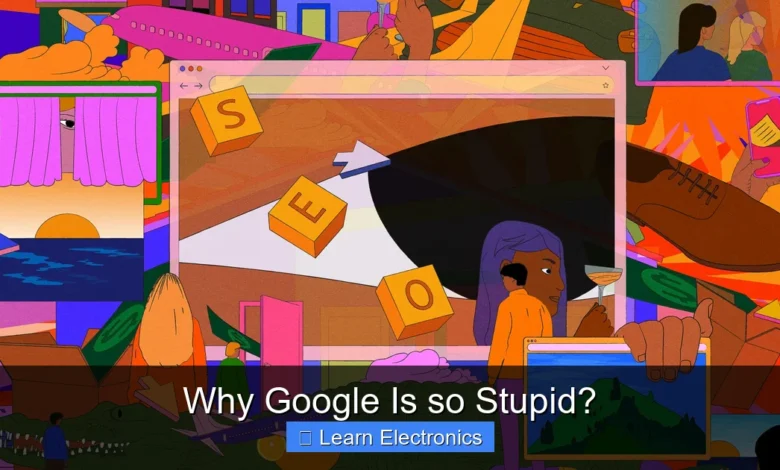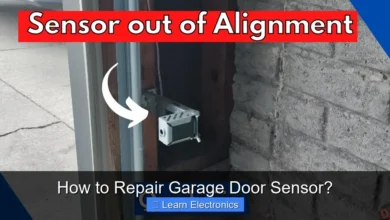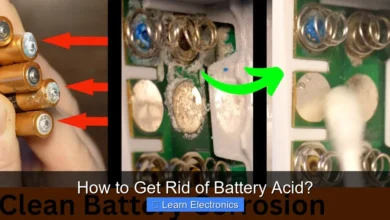Why Google Is so Stupid?

The question, “Why Google Is so Stupid?” when applied to the intricate world of electronics learning, often stems from a fundamental mismatch between the generalized nature of its search algorithms and the highly specific, nuanced, and often visual demands of technical information. This perceived inadequacy highlights the challenges faced when relying solely on broad search engines for deeply specialized fields like circuit design, component specifications, or troubleshooting complex electronic systems. Understanding this limitation is crucial for anyone embarking on a journey to learn electronics effectively, prompting a deeper dive into the specific ways general search mechanisms can fall short.
This approach isn’t about outright condemnation, but rather an exploration of why Google’s pervasive influence doesn’t always translate into perfect utility for niche, technical education. It underscores the necessity of a critical perspective and complementary resources when navigating the vast digital landscape of electronics knowledge.
Quick Answers to Common Questions
Why does Google Search feel less helpful lately?
Many users report that Google Search results are often cluttered with SEO spam or AI-generated content, making it harder to find genuinely useful information. This can make Google seem less intelligent when you’re digging through irrelevant links.
Why does Google Maps sometimes send me on weird routes?
Google Maps relies on a huge dataset, but real-world conditions like temporary road closures, unexpected traffic, or even subtle local knowledge can sometimes throw its algorithms off. That’s when Google gives directions that might make you scratch your head.
Why does Google constantly suggest things I don’t care about?
Even with all the data it collects, Google’s algorithms are still predictions, and sometimes they just miss the mark or get stuck in a past interest. This disconnect can make Google seem surprisingly “stupid” about your current preferences.
📑 Table of Contents
- The Black Box of General Search: Why Specificity Fails
- When AI Hallucinates: The Peril of Auto-Generated Electronics Advice
- The Data Sheet Dilemma: Beyond Simple Text Searches
- Community vs. Algorithm: The Power of Human-Curated Knowledge
- Navigating the Digital Maze: Smarter Search Techniques for Electronics Enthusiasts
- Addressing “Why Google Is so Stupid?” Through a Critical Lens
- Conclusion
The Black Box of General Search: Why Specificity Fails
Google’s strength lies in its ability to quickly provide a breadth of information across myriad topics. However, this generalized architecture can become a significant hurdle when you require highly specific, context-dependent answers in electronics. A search for “capacitor function” might yield thousands of introductory articles, but finding the parasitic inductance of a specific surface-mount capacitor from a lesser-known manufacturer for a high-frequency application is a different beast entirely.
Ambiguity and Context in Technical Queries
Electronics terminology is rife with acronyms, component numbers, and concepts that can be ambiguous without proper context. A query like “555 timer” will bring up its datasheet and common applications, but if you’re looking for an obscure modification for a specific voltage doubler circuit built around it, Google might struggle to prioritize the truly relevant forum posts or application notes amidst a sea of beginner tutorials. The algorithm often prioritizes popularity and broad relevance over deep, niche accuracy, which can lead to frustratingly vague or unrelated results for highly technical questions.
The Problem of Outdated Information
The electronics industry evolves at a breathtaking pace. Components become obsolete, standards change, and new design practices emerge. Google’s index, while vast, doesn’t always discern the timeliness and accuracy of technical information, especially for older or less frequently updated content. You might find a circuit diagram from a decade ago that uses components no longer available or adheres to design principles that have since been refined or superseded by more efficient methods. This can lead learners down unproductive paths, attempting to replicate designs based on outdated advice or incorrect specifications.
When AI Hallucinates: The Peril of Auto-Generated Electronics Advice
The rise of advanced AI and large language models (LLMs) integrated into search functions introduces a new layer of complexity. While powerful for synthesizing information, these models can “hallucinate” or generate plausible-sounding but factually incorrect information, particularly in highly technical fields like electronics, where precision is paramount. This technique of generating answers without true understanding can be dangerous.
Misinterpreting Complex Schematics
AI models are excellent at processing text, but they struggle profoundly with interpreting graphical information like circuit schematics, block diagrams, or PCB layouts. Asking an AI to “debug this circuit” based on a textual description or even a parsed image is likely to yield generic advice or misinterpretations of component connections and functions. The intricate visual language of electronics design requires human expertise to properly decode.
Safety Risks of Incorrect Component Data
Imagine asking an AI for the maximum operating voltage of a specific transistor or the correct resistor value for an LED. If the AI provides incorrect data, it could lead to component failure, damage to equipment, or even safety hazards like overheating or short circuits. The precision required in electronics means that even minor inaccuracies in voltage, current, power dissipation, or pin assignments can have significant, sometimes dangerous, consequences. This practice of relying solely on AI for critical component specifications is ill-advised.
The Data Sheet Dilemma: Beyond Simple Text Searches
For any serious electronics endeavor, the manufacturer’s datasheet is the ultimate source of truth for a component. These documents, however, are dense, highly technical PDFs often spanning dozens or hundreds of pages, filled with graphs, tables, and very specific terminology. Google search can certainly point you to a datasheet, but it struggles with deep, contextual parsing of the information contained within them.
Parsing Manufacturer Specifications
If you need to know the exact propagation delay of a logic gate under specific load conditions, or the noise characteristics of an op-amp at a certain frequency, you typically need to manually navigate the datasheet, interpret graphs, and understand complex parameters. A simple Google search is unlikely to provide a direct, summarized answer tailored to your exact criteria. The process of extracting this specific data still largely relies on human comprehension and careful reading.
Understanding Inter-Component Relationships
Electronics is rarely about a single component; it’s about how multiple components interact within a system. Google can provide information on individual parts, but it’s far less adept at explaining the intricate interplay between, say, a microcontroller’s GPIO pins, an external sensor, and a power management IC, especially when considering timing diagrams, communication protocols, and impedance matching. This level of system-level understanding requires synthesizing information from multiple sources and applying fundamental electronics principles, something beyond the current capabilities of a general search engine.
Community vs. Algorithm: The Power of Human-Curated Knowledge
While Google aggregates information, specialized electronics communities offer something unique: human expertise, peer review, and collective problem-solving. Forums, dedicated Q&A sites, and professional networks often provide more accurate, nuanced, and up-to-date answers to complex electronics questions than a general search ever could. This method of knowledge acquisition is often superior for practical applications.
The Iterative Nature of Electronics Problem-Solving
Troubleshooting a circuit often involves an iterative process of testing, observing, and hypothesizing. A Google search might give you a list of common problems, but a human expert in a forum can ask clarifying questions, suggest specific tests, or point out overlooked details based on their own experience. This dynamic, conversational approach to problem-solving is something algorithms cannot replicate effectively.
Verifying Information Through Expert Consensus
In specialized communities, information is often vetted by multiple experts. If someone posts an incorrect solution or an outdated design, others are quick to correct it, providing a natural peer-review mechanism. This collective intelligence ensures a higher degree of accuracy and relevance compared to the often unverified content found through a general search, which can present conflicting information without clear indicators of reliability.
Navigating the Digital Maze: Smarter Search Techniques for Electronics Enthusiasts
While “Why Google Is so Stupid?” can be a rhetorical question for its limitations in electronics, it doesn’t mean Google is useless. Instead, it highlights the need for users to adopt smarter, more targeted search strategies and combine Google with other resources.
Precision Keywords and Advanced Operators
To overcome the ambiguity problem, use precise keywords. Instead of “LED not working,” try “LED constant current driver troubleshooting” or “LM317 current limit calculation.” Utilize advanced search operators like site:forum.allaboutcircuits.com "op-amp noise reduction" to limit your search to reputable forums, or use quotation marks for exact phrases. This technique significantly refines results.
- Use specific component numbers: Searching for “ATmega328P datasheet” is far more effective than “Arduino microcontroller.”
- Specify document types: Add
filetype:pdfto find datasheets and application notes directly. - Leverage manufacturers’ sites: Often, the best information is directly from the component manufacturer.
Leveraging Specialized Databases and Forums
Don’t rely solely on Google. Integrate specialized resources into your learning process. Websites like Digi-Key, Mouser, and Farnell/Element14 offer extensive component databases with filters, specifications, and links to datasheets. Dedicated electronics forums (e.g., EEVblog Forum, Physics Forums, Stack Exchange Electronics) are invaluable for nuanced questions and troubleshooting. Educational platforms like Coursera or specific university course pages often host well-vetted content.
Another powerful approach involves using search engines designed for technical documents, or directly accessing repositories of academic papers and industry standards. This practice complements general search results with verified, in-depth research.
Addressing “Why Google Is so Stupid?” Through a Critical Lens
The perception of Google’s shortcomings in electronics stems from its design as a general information retrieval system, not a specialized engineering tool. It lacks the contextual understanding, the ability to interpret graphical schematics, and the human judgment necessary for complex electronics problem-solving. Therefore, the issue isn’t that the core process itself is flawed for its intended purpose, but rather that its broad application reveals limitations when faced with highly specific, domain-expert queries.
Comparative Effectiveness of Information Sources
| Information Type | Google Search (General) | Specialized Forums/Communities | Manufacturer Datasheets | AI-Powered Search (Current Gen) |
|---|---|---|---|---|
| Basic Concepts/Definitions | Excellent | Good (for clarification) | Poor (too specific) | Good (but verify) |
| Component Specifications (Exact) | Fair (directs to datasheet) | Good (for common issues) | Excellent (authoritative) | Poor (prone to errors) |
| Circuit Design Examples | Good (diverse range) | Excellent (practical, peer-reviewed) | Good (application notes) | Fair (may be generic/incorrect) |
| Troubleshooting Complex Problems | Poor (generic advice) | Excellent (interactive, experienced) | Poor (diagnostic tools) | Poor (lacks context) |
| Latest Industry Trends/Tech | Good (news articles) | Excellent (discussions, early insights) | Fair (new product releases) | Good (summarizes news) |
Conclusion
The question of “Why Google Is so Stupid?” in the context of learning electronics isn’t an indictment of the technology itself, but rather a crucial realization for anyone diving into this complex field. Google serves as an indispensable starting point for general information, but its generalized algorithms often fall short when confronted with the precision, depth, and contextual understanding required for specialized electronics knowledge. Recognizing these limitations encourages a more strategic and multifaceted approach to learning. By combining targeted search techniques with the invaluable human expertise of online communities and the definitive authority of manufacturer datasheets, learners can effectively navigate the digital landscape and acquire accurate, actionable knowledge. The true intelligence lies not just in the tools we use, but in how intelligently we choose and combine them to achieve our learning goals.
Frequently Asked Questions
Why are Google’s search results so often unhelpful or irrelevant these days?
Many users report frustration with the quality of search results, citing an increase in spam, overly commercial content, or difficulty in finding niche information. This can be attributed to evolving SEO tactics and Google’s algorithm attempting to balance diverse information needs with commercial interests.
Why does Google’s AI sometimes give such nonsensical or incorrect answers?
AI models, including Google’s, are still developing and can “hallucinate” or provide inaccurate information due to limitations in their training data or processing. While constantly improving, they may struggle with nuanced understanding, complex reasoning, or current events not yet fully integrated into their knowledge base.
Why do seemingly simple things within Google products often not work as expected?
User experience issues, bugs, or unintuitive design choices can arise from the immense complexity of managing and integrating countless products and services. Frequent updates and experiments, while intended to improve the user experience, can sometimes introduce new glitches or remove beloved features, leading to frustration.
People say “Why Google is so stupid?”, but what common criticisms lead to this perception?
The perception often stems from various frustrations, including declining search quality, privacy concerns, the discontinuation of popular products, or perceived ethical missteps. As a dominant technology company, Google faces intense scrutiny, and any perceived missteps or failures can amplify negative sentiment among its vast user base.
As an Amazon Associate, I earn commission from qualifying purchases.



